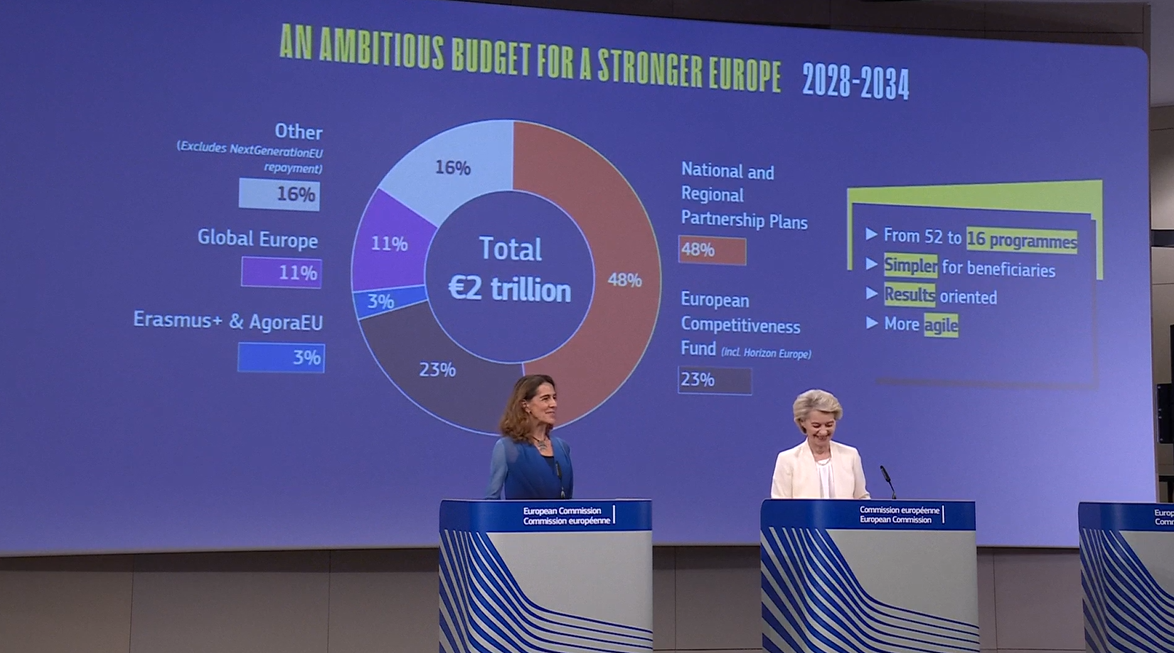Investing EU Money in a Transformative Way
On 6 June 2018, Eurochild and the Learning for Well-Being Foundation hosted an event in Brussels which brought together representatives from the European Commission and civil society to discuss the importance of prevention and cross-sectoral dialogue in the framework of investing EU money in a way that transforms society

Special guest speaker Nancy Mannix, Chair and Patron of the Palix Foundation, opened the event by sharing learnings from the Alberta Family Wellness Initiative (Canada). This initiative focuses on creating alignments between science, policy and practice in the areas of brain development, as there is evidence that there are severe implications on the current and future mental health and well-being of children whose brains are not nurtured properly.
The scientific evidence which proves that adverse experiences in childhood (neglect, abuse, toxic stress) have serious mental and physical effects later in life is robust and has been available for some time. The innovation of the Palix Foundation is how they framed the scientific process of brain development to make it accessible to the public of Alberta and effectively change the cultural narrative. Nancy stated that it was ‘the best money we ever spent’ to create the Alberta ‘belief system’ through various forms of information sharing.
There were two main reactions to this information:
1) there was a huge demand to better understand brain development; more research was commissioned and a ‘brain story certification course’ was designed,
2) private professionals, civil society and the government (including policy makers) of Alberta all began to play their part to ensure healthy brain development in their society. Ultimately, the Palix Foundation strategy generated positive changes at an individual, organisational and systems level in Alberta which make the case for investing in children in an integrated and cross-sectoral way. Indeed, Nancy’s story illustrates that knowledge driven change cannot be ignored and creates a domino effect.
Eurochild has released the findings of Childonomics, a research project aimed at developing a tool to determine the long-term social and economic return of investing in children, by comparing the costs of different services and approaches to supporting children and families in vulnerable situations with expected outcomes for children, families, communities and the society. The outputs of this project contribute to Eurochild’s longstanding advocacy on investing in children on an EU and national level based on solid, scientific research and implemented through a holistic policy framework and accompanying budget.
There is a particular moment of opportunity now for the EU to take action to tackle child poverty and promote investing in children in the framework of the European Pillar of Social Rights and the post-2020 Multiannual Financial Framework (MFF) negotiations.
In this context, two roundtable debates were hosted after Nancy’s presentation. The first was on transformative policies in early childhood and in the community. DG EAC’s proposal for a Council Recommendation on high quality Early Childhood Education and Care (ECEC) was a primary element of discussion. This proposal mentions key points that are necessary to ensure healthy brain development for children in Europe including evaluation and monitoring of systems and indicators of quality in care and education of children, and the need to involve children themselves in the evaluation of their care. The European Council is expected to adopt this Recommendation sometime next year; it will be a significant feat in the field of children’s rights because it raises the issue of ECEC to a high political level within Europe.
Civil society panellists were largely enthusiastic about this future Recommendation, pointing to the fact that the EU can and has boosted quality of life for families through legislative and non-legislative measures (eg. the work-life balance directive). The role of the EU should not be under-estimated, it can lead the EU to have a holistic perspective on child development and boost investment to make integrated services available, affordable and inclusive. Unfortunately, to date, the EU does not have a holistic policy on children 0-3, but evidence of the need for this is becoming stronger, momentum is building and can no longer be ignored.
The cross-cultural and cross-sectoral relevance of brain research was also discussed and, in this context, the need for the provision of quality universal services. Social inclusion is about meeting individual needs; these need to be researched and understood and holistic services created.
The following round table debate centred around the topic of investing in children in the next Multiannual Financial Framework (MFF). First, the strong points already achieved by the European Commission in this arena within its recently released proposal and regulations were discussed. Participants were pleased that the European Social Fund+ (ESF+) managed to achieve the substantial budget of 101 billion, and that measures to support children and their rights can be found as enabling conditions throughout. For example, ECEC is mentioned under gender equality; creating inclusive education, tackling child poverty and ensuring de-institutionalisation are also conditions. Furthermore, the health programme is now under the ESF+, which demonstrates its value and an understanding that more investment needs to be made in this area. Despite all these positive developments, concerns were raised, particularly regarding the health programme.
The concern is that the health programme itself is small, with a small share of the budget – it is not enough to achieve tangible change. The goal of the health programme within the MFF should act as a catalyst for strong prevention within Member States, which, ultimately will prevent huge costs in the future. As the findings in Alberta highlighted, chronic and non-communicable diseases are preventable, they can be stopped by ensuring childhood mental/physical health and well-being. Investment in children in a holistic way is not only a moral imperative, it should be seen as prevention from a medical perspective and cost-effective from an economic perspective.
Ultimately, this was a fruitful and interactive discussion regarding the global relevance of investing in children and which strategies are best used to share this message and implement it effectively. It was clear that on an EU level there is progress but more must be done, especially at this opportune time. The EU must take the lead in transforming European society by pushing for strategic reform on a national level through policy and legislative frameworks which promote prevention and enable integrated services for achieving better outcomes for children.



